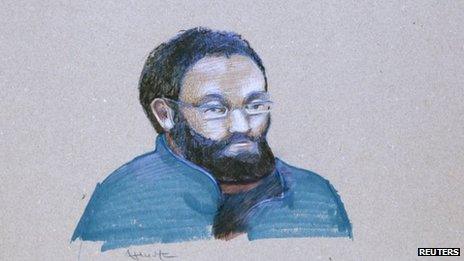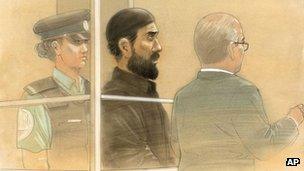Canada train 'al-Qaeda plot' suspects challenge case
- Published

Chiheb Esseghaier declined to be represented by a court-appointed lawyer
Two suspects in an alleged al-Qaeda-backed plot to derail a Canadian passenger train have challenged the case against them.
In a Montreal court, Chiheb Esseghaier, 30, said the case against him was based only on "appearances".
A lawyer for Raed Jaser, 35, said he would "defend himself vigorously", outside his hearing in Toronto.
Officials said the alleged plot had support from al-Qaeda in Iran, although there was no sign of state sponsorship.
Canadian authorities said the two suspects were arrested in Montreal and Toronto on Monday.
Raed Jaser's lawyer, John Norris, said his client's reaction was one of ''shock and disbelief''
Mr Jaser is understood to be a United Arab Emirates national of Palestinian origin, though his lawyer points out he is a permanent Canadian resident who has lived there 20 years.
Mr Esseghaier is thought to be of Tunisian origin.
'Imam's tip-off'
The charges against the pair include conspiring to interfere with transport facilities on behalf of a terrorist organisation and conspiring to commit murder.
Neither suspect entered a plea in Tuesday's hearings.
But Mr Esseghaier said the charges against him were unfair.
"The conclusions were made based on acts and words which are only appearances," he said in French after receiving permission to speak.
He declined representation by a court-appointed lawyer.
Family members of Mr Jaser attended his hearing, where the court banned the publication of evidence and testimony in the case.
His father, Mohammed Jaser, told reporters outside court: "I don't know nothing. Let the police do their job."
The accused face charges of conspiracy to carry out an attack and kill people in association with a terrorist group.
Mr Jaser's lawyer Mr Norris questioned the timing of the arrests, which came as the Canadian parliament debates an anti-terrorism bill that would reintroduce "preventative detention" and investigative hearings.
"I don't know what their purposes were but their timing was notable to say the least," Mr Norris was quoted by the Globe and Mail newspaper as saying.
Mr Esseghaier was studying for a doctorate at National Institute for Scientific Research near Montreal, while Mr Jaser reportedly worked as a customer service agent at a removal firm.
Canadian media have reported the investigation was launched after a tip-off by a concerned imam in the Toronto Muslim community.
The imam was worried that young people in the city were being corrupted by an extremist.
Authorities say the two accused had planned to derail a passenger train in the Greater Toronto area.
The alleged attack was "definitely in the planning stage but not imminent", Royal Canadian Mounted Police (RCMP) Chief Superintendent Jennifer Strachan said on Monday.

The lawyer for Mr Jaser - depicted here in court in Toronto - has questioned the timing of the arrests
The Globe and Mail newspaper reported a Toronto-New York City train was to be the target.
But VIA Rail, which operates passenger rail services across Canada and carries nearly four million passengers annually, said the public was never in danger.
The RCMP said the investigation was a collaborative effort with FBI agents from the US.
Iran has denied any links with the two suspects.
'Hilarious'
Iranian Foreign Minister Ali Akbar Salehi said it was "ridiculous" to suggest any connection between al-Qaeda and Tehran.
"This is the most hilarious thing I've heard in my 64 years," Mr Salehi told the Iranian Isna news agency.
Al-Qaeda - a militant Salafist Islamic movement - preaches a radical anti-Shia ideology that is seen as placing it firmly at odds with Shia Iran.
A US justice department official said there was no connection between the alleged Canada plot and last week's Boston Marathon bombings.
Analysts say Iran's links with al-Qaeda are shadowy and complex.
Assistant Commissioner James Malizia: "Innocent people would have been killed or seriously injured"
Some of the group's senior figures - including Osama Bin Laden's son, Saad Bin Laden, and former security chief Saif al-Adel - are said to have fled to Iran after the US-led invasion of Afghanistan in 2001.
They were allegedly held under house arrest by Iran's Islamic Revolutionary Guard, although Tehran never acknowledged their presence.
According to the US, Saif al-Adel's father-in-law, Mustafa Hamid, is the link between al-Qaeda and the Iranian government.
After the fall of the Taliban, he is said to have negotiated the safe relocation of several senior al-Qaeda members and their families to Iran. In mid-2003, he was arrested by the Iranian authorities.
- Published24 January 2013